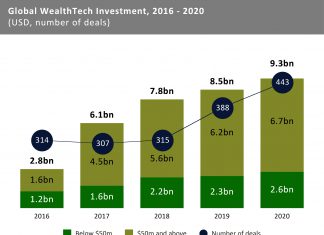This week saw Robinhood become one of the highest valued FinTechs in the world after it reached an $11.2bn valuation.
Robinhood has entered the exclusive list of decacorns after achieving a $11.2bn valuation. The company’s new valuation came after it closed a $200m Series G round from D1 Capital Partners. While not many FinTechs have managed to reach this list, Robinhood is in good company. The likes of Brazilian challenger bank NuBank and digital payments companies Stripe, Ripple and Ant Financial are already among those in the elite group.
Robinhood has not been without challenges during the pandemic. In July, the retail investment platform pulled the plug on its UK expansion plans. This call came after the FinTech chose to ensure stability in the US before undertaking the task of entering a new market, which is rarely a smooth process. When commenting on the decision to stall the UK move indefinitely, Robinhood said, “a lot has changed in the world over the past few months.”
That said, the FinTech has still been able to grow rapidly. Robinhood first entered the unicorn club in 2017 after a $110m Series C. Just a year later and it had reached a $5.6bn valuation and in 2019, it was worth $7.6bn. In May 2020, the company pulled in $280m for its Series F round and later added a further $320m to the series. Its valuation for these capital injections was $8.3bn.
While the FinTech is clearly doing well at the moment, it has not been plain sailing and a number of issues have marred its growth. Here are four setbacks the company probably wants you to forget.
Continuous outages
Robinhood customers have not been the happiest over the past few months, due to a handful of major system outages suffered by the brokerage platform.
Robinhood was in the headlines this year after it suffered not one, but three major disruptions on its platform. Customers were left furious with Robinhood in March, after the investing platform suffered two outages. One of these left users without access to their accounts or the ability to trade for two days.
The problem was blamed on stress on the infrastructure, caused by “highly volatile and historic market conditions, record volume and record account sign-ups.” Robinhood came out with an apology saying this incident was not acceptable and they would improve the technology to avoid it happening again.
Unfortunately it did. In May the company witnessed another issue with its servers, but it was fixed in a more timely manner. Customers were left without access to their accounts for a matter of hours.
In all of the cases, people took to Twitter to hold the FinTech to account and let it know this was not okay. One Twitter user said, “Thank you for being honest and making us aware of your limitations and expected upcoming outages” and another one tweeted. “I hope you learn from this and build on. But I will take my money to those that chose to make the right decisions with their money on protecting their customers. Webull here I come!”
Another tweeted, “Thousands lost. Thousands. Because of your service that I relied on. Be better than this blog post. Please.”
Some of those on Twitter said they would be seeking legal action. Some suggested they would be filling complaints being filed with the U.S. Securities and Exchange Commission and the Financial Regulatory Authority. Others argued that there should be a class action lawsuit for people who lost money in the outage.
However, legal experts stated that those wishing to pursue a case against the investment platform would be difficult to pursue.
Password woes
Advice suggests passwords should be at least 16 characters long, using a mixture of letters, numbers and symbols, and different password for each account you own. Most people fall short of this, but more worrying is that 123456 is still one of the most common passcodes, with it accounting for one in every 142, Ata Hakcil claimed
Getting hold of a user’s password gives a criminal full control of the account and freedom to do as they please. Companies typically store their users’ passwords securely and backed by encryption to stop people accessing them through a hack.
However, it was revealed last year that Robinhood had simply left people’s passwords in plaintext on their internal systems. This means if a hacker managed to get into the Robinhood system they could potentially get hold of the information quite easily.
The investment platform claims that it normally has standards and processes in place that would ensure no one in the company, or any illicit players, can read any customer’s password. Yet somehow this mistake happened. It is unclear how the incident occurred and Robinhood never released how long the passwords had been stored in this manner.
“Infinite money cheat code”
If there is a glitch in a system, no-doubt people will find it. If that glitch helps them earn money then it is safe to assume they will use it as much as they can. Last year, a bug in the code enabled traders on Robinhood to borrow unlimited amounts of capital.
The vulnerability was spread across social media, with some offering videos on how to take advantage of the situation. One Reddit user claimed they were capable of taking a $1m position in stock and only needed a $4,000 deposit. The issue was named the “infinite money cheat code” and according to a report from Business Insider, was used by around 20 Robinhood Gold members. Losses were believed to be less than $100,000 for the company.
The exploit worked by where users could borrow money through the Robinhood Gold service, which was then added to their capital. That meant that they could borrow money to be able to borrow more money. However, those using this bug could be facing some fraud charges.
Following the incident, Robinhood made a permanent update to avoid a similar situation happening and banned the accounts engaging in the glitch. This hasn’t prevented regulators investigating the issue and seeing how it was able to happen in the first place.
Targeting young traders not educated in investing
The point of retail investing apps is that anyone can get involved and build a portfolio. Unfortunately, many adults are uneducated around their finances, leaving them vulnerable to making mistakes. Israel’s Bank Leumi claimed that over 90% of British consumers believe they are uneducated about personal finance. While there are educational tools available in financial institutions, they can help give you the basics and help understand the concepts, but it is not the same as being completely fluent in the positives, but also the negatives of investing.
Robinhood has been criticised for how it attracts its investors and encourages them to engage with the app. An expose from The New York Times reported on one of the Robinhood investor’s Richard Dobatse went on to take out credit card advances and even two $30,000 home equity loans to use on the app.
The company supposedly uses behavioural nudges and notifications to encourage its users to make investments, despite them potentially unaware of the extent of the risk. According to the report, Robinhood investors are way more engaged with risky investments than other brokerage platforms.
Dangers of this method were brought to light after college student Alex Kearns tragically took his own life after he logged into the app to see his balance was a negative $730,000. This number was partly due to incomplete trades. In a note from Kearns, which the family later posted on Twitter, he said that he never intended to take that much risk.
Robinhood’s co-founders responded to the incident stating they would tighten eligibility criteria, expand educational resources and make improvements to the user interface for customers trading options, according to Forbes.
Copyright © 2020 FinTech Global











